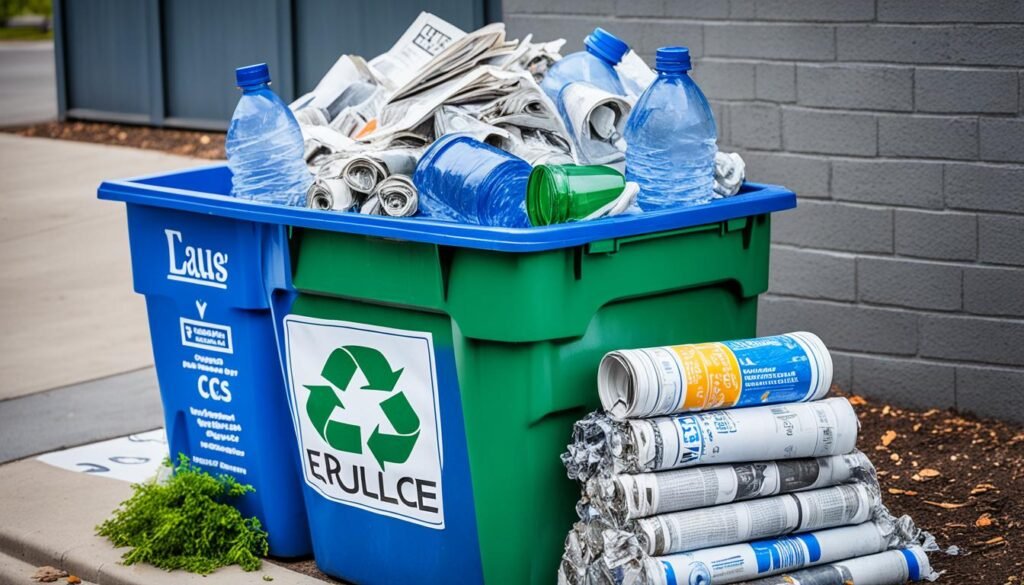Did you know recycling one plastic bottle saves enough energy to light a 60-watt bulb for six hours? Waste management is vital for protecting our planet and encouraging sustainable living. By using efficient waste tips in eco-friendly homes, you help lessen waste, save resources, and cut down on pollution.
Recycling is a key method in waste management. It means separating trash into categories and turning it into new stuff. Recycling saves natural resources and lessens the need for landfills. Landfills can cause pollution and release harmful gases into the air.
Another important approach is reducing and reusing waste. Using less and reusing things helps lower the amount of trash we make. For kitchen scraps, try composting or using a garbage disposal. There are also special sites for safely getting rid of harmful waste.
Putting these waste management ideas into practice in your eco-friendly home is great for the earth. It also sets up a green future for everyone. Start making a difference in how you manage waste today!
Key Takeaways:
- Recycling is an essential waste management method that conserves resources and reduces landfill waste.
- Waste reduction and reuse strategies help minimize waste production and promote sustainability.
- Garbage disposals and composting are effective ways to manage kitchen waste.
- Hazardous waste sites ensure the proper disposal of harmful substances.
- Implementing these waste management tips in eco-friendly homes contributes to a healthier environment and sustainable living.
Recycling as an Eco-Friendly Waste Management Method
Recycling is key to managing waste in an eco-friendly way. We sort waste like plastics, paper, glass, and aluminum for recycling. This process has big benefits. It reduces our carbon footprint and helps create a healthier, sustainable world.
Recycling lets us make new items without needing new raw materials. It saves about 20% of energy. For instance, recycling paper cuts down on deforestation. It saves natural resources and lowers the use of landfills. This reduces harmful gases and the greenhouse effect.
In 2017, the U.S. saw a huge decrease in waste thanks to paper recycling. Recycling doesn’t just cut down waste. It benefits the environment and economy too. By recycling things like clean bottles and avoiding plastic bags, we make waste management better.
Recycling reduces landfill waste and our carbon footprint. It cuts down on energy use too. By recycling more, we ensure a sustainable future for all.
The Impact of Recycling:
| Environmental Benefits | Economic Benefits |
|---|---|
| Reduces the need for raw materials | Creates job opportunities in the recycling industry |
| Conserves natural resources | Reduces waste disposal costs |
| Minimizes greenhouse gas emissions | Promotes a sustainable economy |
| Prevents pollution | Stimulates innovation in recycling technologies |

Waste Reduction and Reuse for Effective Waste Management
Waste reduction and reuse are key to managing waste better. By using these methods, you help the environment and support green living. You become a smart shopper too. Waste reduction means using fewer materials from the start. Reuse lets us use items again as they are.
To cut down on waste, think about what you buy. Try to buy less and choose items with little or no packaging. Look for packaging that’s made of recycled stuff. Following the 3 Rs – Reduce, Reuse, Recycle – is a great way to live more waste-aware.
Reusing things is a smart move too. Many items we toss out could be used again. For example, pick reusable over throw-away kitchenware to cut down on trash. Get creative at home and find new uses for old items.
Remember, reducing and reusing waste is crucial. It helps keep our planet balanced and lessens waste’s bad effects on nature. By making these practices part of your day, you help lower the amount of trash and improve how we handle waste.
Benefits of Waste Reduction and Reuse:
- Minimizes waste production
- Conserves natural resources
- Promotes sustainability
- Reduces carbon footprint
- Decreases landfill waste
- Encourages responsible consumption
Choosing to reduce and reuse waste makes you a part of the move toward sustainable living. You become an earth-friendly buyer.
| Waste Reduction and Reuse Strategies | Benefits |
|---|---|
| Buy less and reduce product consumption | – Minimizes resource depletion – Reduces waste generation |
| Opt for reusable products | – Reduces the need for disposable items – Decreases landfill waste |
| Repurpose items | – Extends the lifespan of materials – Reduces waste accumulation |
| Embrace thrift shopping and second-hand items | – Reduces manufacturing demand – Decreases environmental impact |
By following these strategies, you support green waste management. Small everyday actions can greatly reduce waste. This helps us all live more sustainably for a healthier planet.

Conclusion
Efficient waste management is key to eco-friendly living. Recycling, reducing waste, reusing things, and composting are great ways to help. These actions also lower our impact on landfills and protect our planet.
Recycling is very important. It helps cut down our carbon footprint and saves natural resources. By recycling things like plastics, paper, glass, and aluminum, we make our environment healthier.
Reducing waste and reusing items are also smart moves. They shrink the amount of trash we produce. This helps keep the natural world in balance and reduces harm from waste.
Managing kitchen waste with garbage disposals and composting helps too. Getting rid of hazardous waste the right way also stops pollution. This keeps our environment clean and safe.
By following these waste management steps, we can impact the world positively. It’s good for our planet, and for everyone’s future. Let’s start doing our part for a greener future today.
